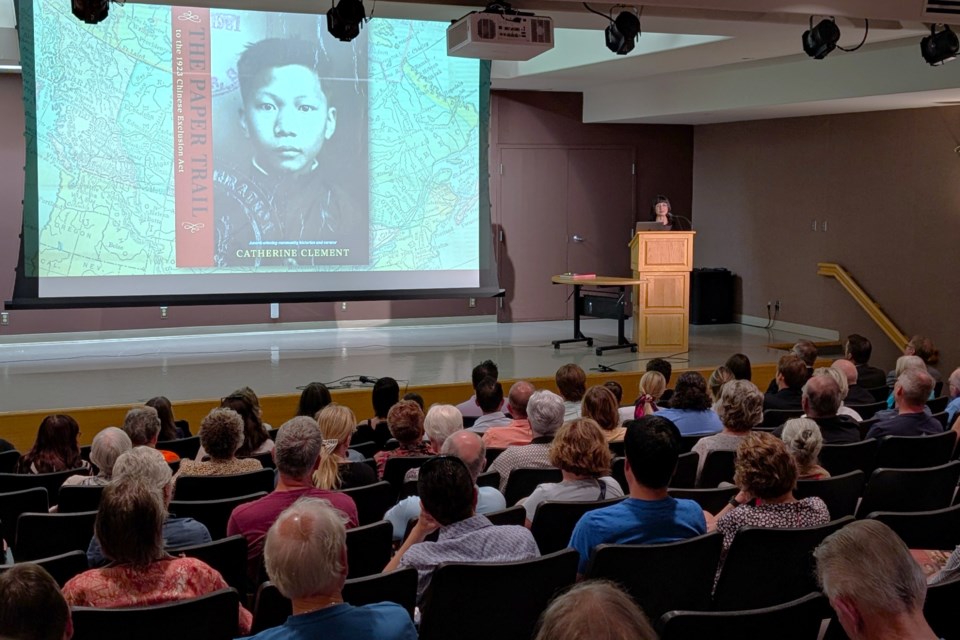MOOSE JAW — Situated beneath the soft stage lights of the Moose Jaw Museum and Art Gallery’s theatre, author Catherine Clement blinked back tears as she delivered the final words of her presentation — a tribute, she said, to “those who walked through the long, dark winter of exclusion.”
Clement’s recent talk drew a full house for the only Saskatchewan stop on her national tour for The Paper Trail, a book that chronicles the Chinese Canadian experience during one of the country’s most shameful policies: the 1923 Chinese Exclusion Act.
“This project was transformational,” Clement told the audience. “It fundamentally changed who I am and how I see things.”
Passed on July 1, 1923 — now Canada Day — the Act banned nearly all Chinese immigration and required every person of Chinese descent living in Canada to register with the federal government. Between 1923 and 1947, over 56,000 people were subjected to invasive documentation requirements, including fingerprinting and government-issued photo ID — long before such practices became common.
In Moose Jaw, 431 Chinese residents registered under the Act. Only 14 were women. Local figures such as Sang (Charlie) Chow, Wong Higgew, and Wong Poy Jing were among those who complied with the registration orders, their names now preserved in federal archives.
Clement’s book — initially launched in Vancouver — unearths the lives behind those registrations. Many had been silent for decades.
“What I came to realize,” she said, “is that silence speaks volumes.”
Clement said she was struck by how little the descendants of those who lived through the exclusion years knew. In nearly every household she visited across the country, the same answer came up when asked about a father or grandfather’s experience: “I don’t know.”
The silence, she explained, wasn’t an accident. After the Act was repealed in 1947, many Chinese Canadians tried to move on, assimilate, and forget — often at great emotional cost.
One particularly poignant story came from the Prairies. In 1924, a man named Long Woo opened a silk store in Lethbridge, hoping to elevate his status and bring his wife to Canada. But when the Exclusion Act took effect, he was said to have suffered a mental breakdown, opened the doors of his shop and invited passersby to loot it. He was institutionalized for two years and never recovered his store or dream of family reunification.
“I thought the exclusion years couldn’t have been that bad,” Clement said. “But what I discovered was worse than I could have imagined.”
In the 12 months following the Act’s passage, dozens of suicides were reported in Chinese communities across the country. Clement said many of the men who had worked in Canada for decades, supporting families back home, were eventually cut off entirely.
“And for some,” she added, “exclusion was a life sentence.”
Others survived, often in quiet, uncelebrated ways. Clement highlighted stories of resilience: Prairie women who fed their children by trapping skunks, Nin Fun Yee, who was rescued by Indigenous families when white doctors refused to treat him, and bachelors known as “the uncles” who helped raise neighbours’ children as if they were their own.
Joan Hepburn, a Moose Jaw-born daughter of Charlie Chow, attended the talk and shared a heartfelt moment with Clement afterward. Now 95, Hepburn shared that she grew up surrounded by many of the very businesses and names featured in Clement’s presentation — a legacy that lives on through restaurants, laundromats, and family lines.
The event was hosted with support from the Moose Jaw Chinese Community Network and the Jack and Sylvia Gin Foundation in Vancouver, which helped sponsor her presentations.
Clement closed her remarks with a call to carry forward what has been rediscovered.
“We must not go back to being silent,” she said. “It is now the duty of a new generation to pass on to future generations all that we have discovered and felt and remembered.”
For more information on The Paper Trail or to purchase a copy, visit PlumLeafPress.com.




